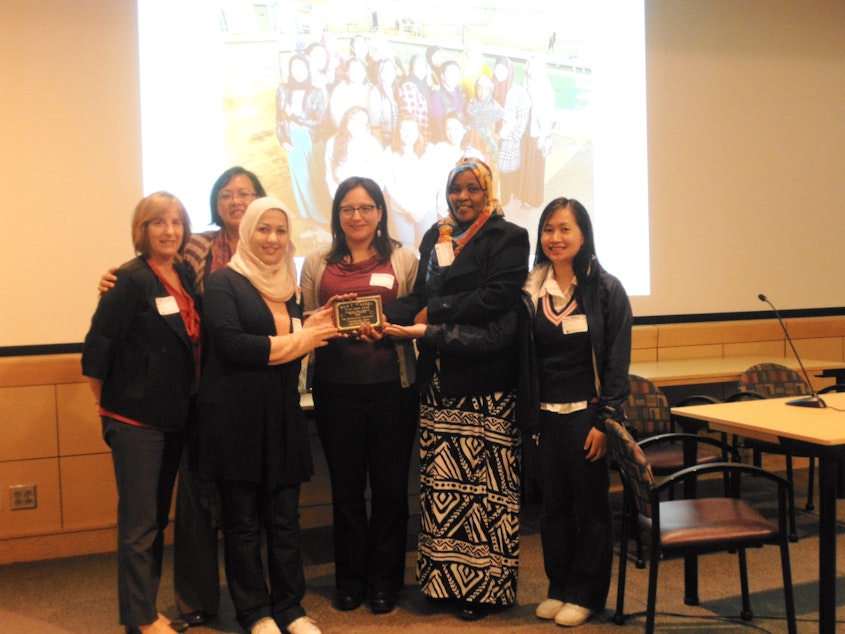Seattle Immigrant Women Overcome Cultural Constraints To Exercise

Physical activity is good for the body and mind, though finding time to exercise can be a challenge. But for some people, time is not the only issue. Many Muslim women find that cultural constraints limit their options. A group of immigrant women in Seattle found a way to overcome that challenge.
On a Saturday afternoon at Southwest Pool in West Seattle, swimmers practice their strokes, or relax in the whirlpool. It looks like a typical day at a public pool. But then you notice a few things seem different. There’s paper covering the windows, and the lifeguard and instructors are all female. So are the swimmers.
This is Seattle Parks’ newest offering: a women-only swim program.
Seema Junajil and Sahra Ahmed have just finished their swim lessons. They’ve been coming here since last September. “Here, to swim with single gender, you feel comfortable,” says Seema. “It’s a great opportunity and I’m enjoying it.”
Sahra nods in agreement. “I don’t like to miss it,” she says. “I don’t like to do nothing else.”
Sponsored
Seema is from Pakistan. Sahra is from Somalia. Both are Muslim. They say having a women-only swim program allows them to get some exercise while observing their religious customs. Seema says their religion requires them to cover in front of men. “We don’t cover our heads in front of our husbands, our dads, brothers,” she says. “But when we go outside we’re supposed to cover for woman’s modesty.”
At Southwest Pool there are women wearing swimsuits. But most prefer to cover up. Sahra has shed layers of clothes from what she usually wears during the day. In the pool she’s wearing two shirts and pants. She knows she can wear less, but she’s more comfortable this way. “I’m already halfway,” she says, and laughs. “I cannot go lower than that.”
Sahra says it’s nice that she can wear layers of clothes to the pool and nobody cares. When she’s not swimming, she wears traditional attire that covers her from head to toe. She’s tried to go for walks with her friends. But sometimes her clothes draw unwanted attention and comments. People don’t understand and make remarks. “Sometimes you cannot answer and you ignore them,” Sahra says.
The idea for a women-only swim program started in the High Point neighborhood, a mixed-income community. Many of the residents here are immigrants, mainly Somali.
Jen Calleja is with Neighborhood House, a nonprofit organization that provides social services to the community. About four years ago, Neighborhood House got a grant from the National Institutes of Health to promote physical activity among low-income residents at High Point. To do that, Calleja first surveyed residents about the kinds of activities they wanted.
Sponsored
“Other groups said exercise class, tai chi, walking groups, field trips,” says Calleja. But those programs already exist and the barriers, things like cost and distance, were things that could be worked out.
But what Calleja also found was that Somali women were the most underserved group in the community. There were cultural constraints that made it hard for them to get exercise. “They needed private space, they needed to be for women only,” says Calleja.
The women requested swimming — many times. So when the community clinic in the neighborhood sponsored a swim for a brief time, the program was well-attended. It also attracted non-immigrant women. When that program ended, the Somali women asked Neighborhood House if there was a way to make it permanent.
Immigrants are the fastest growing group in the United States. Yet their health in general worsens after they come here, says Calleja. Their diet changes, often to more processed foods. Physical activity happened more naturally back home. But here, they become more isolated. Calleja says after 9/11, there were a lot of negative perceptions of Muslim people, and it took them a while to feel comfortable to get out of the house.
“A lot of them stay home, stay home with their kids,” she says. And being indoors can lead to a lot of health problems such as high blood pressure, diabetes and depression. With help from Neighborhood House, the women approached Seattle Parks about starting a women-only program in West Seattle. The department has rented out pools for single-gender swims before and agreed. The women would pay to swim. They would also need at least 32 people to get started.
Sponsored
The women’s response was enthusiastic. Those who couldn’t get in were put on a wait list. Earlier this year the department decided to make it a permanent part of its program.
Aayan Aden was among the women who took the request to the city. She says she’s grateful that the city listened. She’s thrilled that her community will always have an opportunity to swim and be true to her culture.
“In order to do that you have to live your culture, or your religion, or you don’t do it,” she says. “But now you have opportunity to practice what you practice, wear whatever you want to wear [and] don’t feel excluded, but feel included.”
This month the city expanded the women-only swim program to two other pools at North Seattle’s Meadowbrook Pool and at Medgar Evers Pool in Central Seattle.

